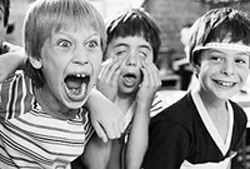Some students have difficulty paying attention in class, act hyperactive or impulsive. They exhibit various characteristics that can be bothersome to teachers, other students and even themselves.
Students who have problems paying attention are easily distracted. Hyperactive students often get restless sitting in class and may fidget with their hands or feet or squirm in their seats. Some students are impulsive, blurting out answers before questions have been completed.
Reasons for active behaviour
There are a number of reasons that some children or students have short attention spans, may seem hyperactive, or are impulsive. In extreme cases, such a child is labelled as having Attention Deficit Disorder (ADD) or Attention Deficit Hyperactive Disorder (ADHD). Being aware of these reasons is important is establishing teaching strategies to deal with the situation.Teacher strategies
Teachers can use some strategies to cope with overly-active students, as well as those who have ADD or ADHD.Classroom characteristics
Classroom characteristics that promote success for many hyperactive children include:- Predictability and structure of classroom activities
- Shorter work periods
- Small teacher to pupil ratio and more individualized instruction
- Interesting curriculum
- Use of positive reinforcement
Teacher attitudes
Research literature suggests a number of useful teacher attitudes, including:- Positive academic expectations
- Frequent monitoring and checking of work
- Clarity in giving directions
- Warmth, patience and humor
- Consistency and firmness
- Knowledge of different behavioral interventions
- Willingness to work with a special education teacher
Self-monitoring
Student responsibility for his or her behavior is often effective. Usually students realize they have a problem and want to correct it. Self-monitoring techniques can be effective in the school setting.teachers can help self-monitoring of attention by cueing the student so that he can determine how well he is attending to the task at hand. One method is to use an audio tone such as a random beep.

No comments:
Post a Comment